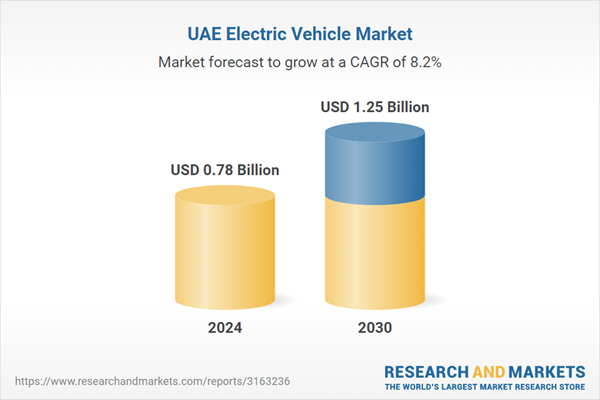Dublin, Oct. 15, 2025 (GLOBE NEWSWIRE) -- The "UAE Electric Vehicle Market, By Region, Competition, Forecast & Opportunities, 2020-2030F" has been added to ResearchAndMarkets.com's offering.
The UAE Electric Vehicle Market was valued at USD 0.78 Billion in 2024, and is expected to reach USD 1.25 Billion by 2030, rising at a CAGR of 8.22%. The market is witnessing significant growth, supported by strong government initiatives aimed at reducing carbon emissions and promoting sustainable transportation. Policies such as incentives for EV buyers, zero registration fees, and expanding charging infrastructure are encouraging both consumers and manufacturers. Increasing environmental awareness and high fuel prices are also driving the shift towards electric mobility.

Major automotive players are launching new electric models tailored for the UAE market. In 2024, electric vehicle (EV) sales in the UAE grew by 38% year-on-year, fueled by rising fuel prices, greater availability of EV models, and increasing consumer confidence in EV technology. The strongest demand was seen in the compact SUV and sedan categories, highlighting a preference for practical, city-friendly vehicles. This shift in consumer behavior, supported by economic and technological factors, is a key driver of market demand.
Key Market Drivers
Strong Government Support and Visionary Policies: One of the primary drivers of the UAE electric vehicle market is the proactive support and vision demonstrated by the government. The UAE has set ambitious sustainability goals through initiatives like the UAE Net Zero 2050 Strategic Initiative and Dubai Clean Energy Strategy 2050, both of which emphasize a reduction in carbon emissions and the adoption of cleaner transportation alternatives.
In line with these objectives, several regulatory policies and incentives have been introduced to encourage the use of EVs. These include waiving registration and renewal fees, free public parking, exemption from toll charges (Salik), and access to dedicated green vehicle lanes in some emirates. Authorities such as the Dubai Electricity and Water Authority (DEWA) and Abu Dhabi Department of Energy are playing a vital role in pushing the electrification agenda forward. The UAE's leadership is actively working to position the country as a global hub for clean mobility, making government backing a critical growth catalyst.
Key Market Challenges
High Upfront Cost of Electric Vehicles: One of the primary challenges hindering the widespread adoption of electric vehicles in the UAE is the relatively high initial purchase cost compared to internal combustion engine (ICE) vehicles. While EVs promise long-term savings through lower operating and maintenance costs, the upfront price remains a major barrier for middle-income consumers. This is particularly significant in a price-sensitive segment of the market that prioritizes affordability over sustainability. Imported EV models, especially premium brands like Tesla, BMW, and Audi, often come with hefty price tags due to import duties, shipping costs, and the absence of local manufacturing.
Moreover, battery production-which constitutes a large portion of an EV's cost-is still expensive, despite global efforts to scale and optimize it. Although the UAE government provides incentives such as free parking and registration fee waivers, there are currently no direct subsidies or tax rebates on EV purchases, unlike some Western and Asian countries. Without significant price reductions or financing support, many consumers still view EVs as luxury or niche products, slowing mass-market adoption.
Key Market Trends
Strategic Partnerships and Automotive Innovation: Strategic collaborations between government entities, international automakers, technology providers, and energy companies are also fueling the growth of the EV market in the UAE. Several joint ventures and public-private partnerships have emerged to develop EV production, infrastructure, and service ecosystems. For instance, Etihad Rail, ADNOC Distribution, and Bee'ah have launched initiatives to incorporate EVs into their fleets.
International OEMs such as Nissan, Tesla, Hyundai, and BYD are introducing their latest electric models to the UAE market, supported by localized marketing and service centers. Additionally, innovation in battery technology, autonomous driving features, and smart mobility solutions is making EVs more appealing and accessible. The integration of digital platforms, predictive maintenance, and AI-based performance monitoring is enhancing the ownership experience. The UAE's open approach to innovation and foreign investment makes it an attractive destination for automakers to pilot advanced mobility solutions, ultimately reinforcing the EV market's long-term prospects.
Key Players Profiled in UAE's Electric Vehicle Market:
- Hyundai Motor Company
- Tesla, Inc.
- Volkswagen Motor Company LTM
- General Motors Company
- Groupe Renault
- BMW AG
- Ford Motor Company
- One Moto Technologies LTD.
- Rivian, LLC
- Mitsubishi Fuso Truck and Bus Corporation
Report Scope
In this report, the UAE Electric Vehicle Market has been segmented into the following categories:
By Vehicle Type:
- Two-Wheeler
- Passenger Car
- LCV
- M&HCV
By Range:
- 0-50 Miles
- 51-150 Miles
- 151-200 Miles
- 201-400 Miles
- above 400 Mile
By Propulsion:
- BEV
- HEV
- PHEV
- FCEV
By Region:
- Dubai
- Abu Dhabi
- Sharjah
- Ajman
- Rest of UAE
Key Attributes
| Report Attribute | Details |
| No. of Pages | 85 |
| Forecast Period | 2024-2030 |
| Estimated Market Value (USD) in 2024 | $0.78 Billion |
| Forecasted Market Value (USD) by 2030 | $1.25 Billion |
| Compound Annual Growth Rate | 8.2% |
| Regions Covered | United Arab Emirates |
For more information about this report visit https://www.researchandmarkets.com/r/ulvv6c
About ResearchAndMarkets.com
ResearchAndMarkets.com is the world's leading source for international market research reports and market data. We provide you with the latest data on international and regional markets, key industries, the top companies, new products and the latest trends.
Attachment
